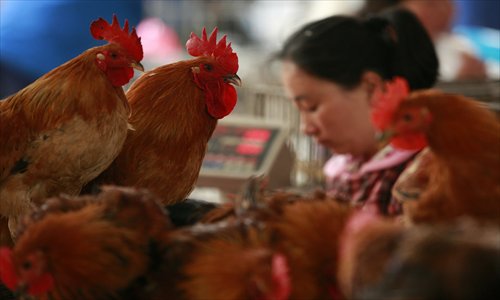Four new H7N9 cases confirmed

Four new cases of people being infected by the new H7N9 bird flu were confirmed by health authorities in Jiangsu Province late Tuesday, bringing the total number of infections in the country to seven.
Three women and one man from four cities in Jiangsu are in critical condition and are undergoing emergency treatment, while the source of the infections still remained unclear, according to a statement issued by the provincial health department.
The statement said 167 people who had close contact with the four infected have not shown fever or respiratory problems so far, two major symptoms of the avian influenza.
Liu Youning, a respiratory expert with the People's Liberation Army General Hospital, played down the possibility of a large-scale outbreak of the influenza, noting the current cases are still sporadic.
"Whether the viruses are contagious between humans remains a critical issue, and if it is, it means the disease is dangerous to the general public," Liu told the Global Times on Tuesday.
No evidence of epidemiological connection had been confirmed between the four new cases, said the statement.
Health authorities in Shanghai also ruled out the possibility of inter-infection among the two fatal cases in the city at a press conference on Tuesday.
Wu Fan, director of the Shanghai Municipal Center for Disease Control and Prevention, said the source of infection has yet to be determined.
"The younger son of a dead patient died of severe pneumonia and the elder son also tested negative for the virus," said Wu.
Liu also said that the new reported cases do not necessarily mean the virus is spreading, but these cities contain adverse factors such as the local poultry industries.
According to the Jiangsu health department, one of the infected, 45-year-old Xu, is a poultry slaughterer in the capital city of Nanjing. But no direct connection between poultry and the other three was found.
"The priority is to find the source and to find out if the influenza virus has mutated to become contagious among humans and what kind of medicine is effective against the virus," Liu said. "With all these uncertainties, the public should try to avoid contact with poultry or other livestock and all infected patients should be separated from the general public."
Wu stressed the research on the virus remained a focus, given that vaccines against it were still unavailable worldwide, and research on the vaccines would take time.
Shanghai health authorities announced on Tuesday they had launched a third-level emergency response to avian influenza.
Xu Jianguang, director of the Shanghai Municipal Health and Family Planning Commission, said daily reports will be issued on the supervision of unexplained pneumonia cases within 43 monitoring stations and 130 medical institutions in the city.
Yin Ou, a deputy director with the city's agricultural authority, gave reassurances that chicken and pork products on the Shanghai market are still safe to eat.
In response to speculation that the new virus was related to the numerous dead pigs found floating on Huangpu River in Shanghai, Yin said no bird flu viruses had been detected from the 34 samples of the dead pigs.
Beijing also said on Tuesday that test reagents for the virus have reached the Chinese capital and the avian influenza had been added into its existing monitoring system for regular influenza and unexplained pneumonia.
Fadela Chaib, a spokesperson with the WHO, told reporters Tuesday that the cases were of concern to the WHO. China will share information with the organization, which will share information with member states.
"We need to further investigate the extent of the outbreak, the source of the infection and the mode of transmission," she said.
Xinhua contributed to this story